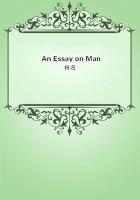It is a great inconvenience of taxes on consumption, that it never can be known at their establishment who is to pay them in the long run. The legislature always proposes to make them be reimbursed by the consumer; but sometimes they do not reach his distance; at other times, they do not stop at him, and the consumer is anew reimbursed for them by those for whom he labours. To make the consumer pay the whole tax, the nation must be in a state of increasing prosperity; for otherwise, as the consumer is not richer than before the tax, he cannot devote more money than formerly to his enjoyments, and must, therefore, in some shape, diminish his consumption. The producer, on his side, no longer selling the whole of his goods, must diminish his production, or consent to pay a portion of the tax. If a public calamity happens, a scarcity or even a state of embarrassment in trade, consumption still further diminishes; and the producer, compelled to dispose of his goods, pays the whole tax; till, no longer finding any profit in his labour, he abandons it entirely.
On the other hand, when taxes and consumption have raised the price of every thing, industrious men, who form a numerous class among consumers, no longer find in their industry sufficient resources to support them. His wages no longer furnish the day-labourer with those limited enjoyments which are to be reckoned among the necessaries of life, since life, or the power of labouring, could not long be maintained in an individual deprived of every pleasure. He struggles, therefore, with all his strength, to get his wages increased; the manufacturer and merchant, in like manner, to get their profits increased. As the total sale diminishes, it is necessary for their subsistence that they obtain more for each separate article. Their joint efforts soon succeed in raising the price of all goods coming from their hands, but especially goods of prime necessity, because the sellers of these give the law to buyers, who cannot do without such goods. A rise in the price of those commodities reacts anew on wages and profits; the disorganisation becomes complete; national productions cost much higher than those of countries not oppressed by a similar system; they cannot support a competition in foreign markets; exportation ceases, demand is not renewed, and the nation sinks under a frightful distress.
If a universal impost on consumption presents insuperable difficulties, partial imposts are equally liable to inconveniences. When one kind of goods has been taxed by universal custom, as salt is, a considerable sum of money has indeed been raised; but a tax on consumption has been changed into a sort of capitation, which weighs equally upon the poor and upon the rich, without any regard to the contributor's fortune, or his means of ****** payment. The salt tax, when so considerable that the day-labourer feels the weight of it, is, perhaps, the most unequal of all imposts. The poorest house consumes as much as the richest; but the poor must take, from what is essentially necessary to their subsistence, a sum which the rich scarcely notice in their superfluity.
It were vain to seek, among articles of consumption, for one which is proportioned to expenditure or to wealth; some are sought after by the rich alone, hut they do not use them in proportion to their riches. A duty of consumption on tea, sugar, spices, does not reach a class so numerous as a duty on salt; but among those paying it, this duty is proportioned only to what a single individual can employ in his use. It spares the poor, but it weighs not upon the rich; it is, consequently, very unproductive, whilst duties extending to the smallest consumption are the only ones which bring in much to government.
By degrees, duties on consumption have been extended to every kind of production. It has been imagined that if the rich man was made to pay a first capitation on salt, a second on light, a third on drink, a fourth on food, a fifth on clothes, there would be established a kind of proportion between his contributions and his fortune; because he would pay a much greater number of taxes than the poor man, although each tax, being limited by the individual's physical wants, was disproportioned to his wealth.
The impossibility of establishing a uniform and universal law, was clearly felt; and the attempt was made of approximating to it, by a multitude of partial laws.
Hence has arisen a fourfold division of duties on consumption, which are adopted in almost all countries; namely, the gabelle, custom, excise, and tolls. The gabelle comprises those commodities of which the government claims a monopoly, salt and tobacco, for example; it sells them alone, at a high price, by its agents or favourites, and prosecutes by rigorous penalties all such as attempt to take a share in their manufacture or trade. Customs are destined to levy a proportionate duty on goods imported from foreign counties; and the excise, or aids on goods produced in the country itself. The former is only established in the confines of the territory; and although the advancement in price of those taxed commodities is equally felt over the whole state, the vexations which accompany the levying of duties are confined to the frontiers alone. The latter is to levy the tax wherever industry is exercised; it consequently must comprehend, under its inspection, all productive workmen, all the most useful citizens of the state; and it cannot reach them, except by an inquisition almost constantly destructive of security and *******. Tolls, in the last place, established at the gates of towns, form the fourth class of duties on consumption. As the most important department of the national exchange is that between the industry of towns and the industry of the country, tolls are destined to reach the latter, and to subject the goods produced by agriculture to a proportionate tax, at the moment when they come to be consumed by the inhabitants of towns.














